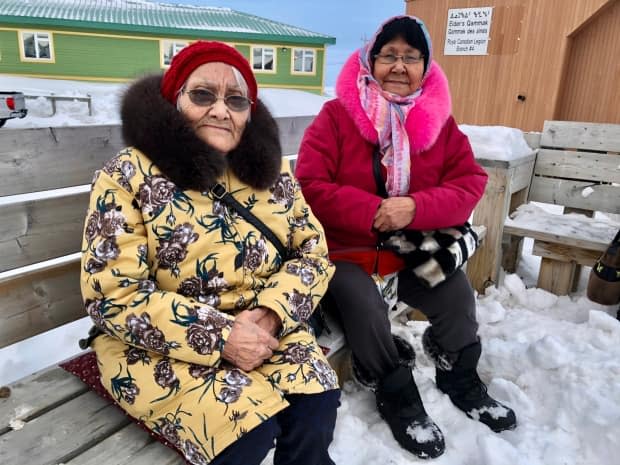Mine blockade sparks solidarity protests across Nunavut
Community members across Nunavut came out in peaceful protests today, to show solidarity with a group of hunters who continue to blockade the Mary River iron ore mine on North Baffin Island.
Protesters at the blockade from Pond Inlet, Igloolik and Arctic Bay say Inuit harvesting rights are being ignored in the company's bid to expand the mine.
Demonstrations started in Pond Inlet last week. New protests were held today in Iqaluit, Igloolik, Naujaat and Taloyoak.
Elder Annie Nattaq called for the protest in Nunavut's capital. Around 30 people gathered at the Iqaluit seniors centre.
"Although Pond Inlet is far from here, I don't get fish or whale meat from there anymore. I'm affected too. I support the people of Pond Inlet," she said in Inuktitut.
Baffinland Iron Mines Corporation wants to double its annual mining output to 12 million tonnes. To do this, it would build a railway and increase shipping through its port at Milne Inlet. The waters surrounding the port are a crucial habitat for narwhal in the Canadian Arctic.

Mekai Popoff, who is originally from Pond Inlet, said Nunavut's founders fought hard for Inuit to have a say over their lands.
"I do support economic development. Just remember what our former leaders have given up just so that we can have Nunavut, we can't just give that up," she said.
'We are thinking about our younger generations'
The remote mine takes days to travel to by snowmobile from Pond Inlet and surrounding communities, so the group at the blockade remains small, around 10 men as of Saturday, though more were joining with supplies.
Naujaat protest organizer Donat Milortuk said he wants the hunters at the blockade to know they are not alone.
"We are thinking about our younger generations. We want a clean environment and healthy food. This is everyone's responsibility," he said in Inuktitut. "We don't want our wildlife and land contaminated."
On Thursday, the protesters shut down the mine's trucking road and airstrip. They say they are peaceful. The men do carry firearms, as part of their safety equipment for travelling in an area where there could be polar bears.
The blockade protesters say they won't leave until the concerns communities have about wildlife are reflected in environmental hearings being held to discuss the expansion.
While negotiations for the expansion have been going on for years, community groups and the Baffinland remain at odds over what impacts the project will have. The mine operations take place on Inuit-owned lands.

Mine has 700 stranded workers
Baffinland says it respects the right to protest, but the blockade is a safety problem.
Because the airstrip is shut down, there are around 700 staff stuck at the mine site. Food, supply and crew change flights are suspended, and the airstrip can't be used for search and rescue or medical flights until maintenance is done.
"Baffinland personnel have had numerous meetings with organizers, both at the blockades and in Pond Inlet, imploring the protestors to relocate off the airstrip and allow runway maintenance to take place and flights to resume," Baffinland said in a Monday release. "So far, these discussions have not yielded any progress."
The protests are directed to the mine, but also to territorial leaders.
Under the Nunavut Agreement, the mine has to negotiate benefits that go to Inuit with the Qikiqtani Inuit Association. In a press release today, Baffinland said protesters are asking for a new North Baffin Inuit organization and the communities closest to the mine to be paid mining royalties directly.
The mine says it hears the requests but has no authority to make changes.

While the group of protesters call themselves hunters, they are not associated with the Mittimatalik Hunters and Trappers Organization (MHTO) in Pond Inlet, said chairperson Eric Ootoovak.
He did thank the men for their actions.
"It shows that the mining company is really damaging our environment and our animals and these people are noticing," he said. "I believe they want the world to know what Baffinland is doing to our environment."
The MHTO has been negotiating with Baffinland and other Inuit groups over final plans for the expansion for the past two years. It's not happy with how a two-week hearing finished on Saturday.
"The people in general are not against mining," Ootoovak said, but added, "the mine at present, we believe, is quite enough.
"They've done enough damage as is, for only six million tonnes that they're allowed."
Baffinland says its expansion would have a lifespan of around 30 years. It's promising more than $2 billion in royalties to Inuit.
The project was first proposed in 2014. The mine has been producing iron ore since 2015. Baffinland says it needs the expansion to be profitable.
Another gathering is being scheduled for March to bring all the impacted communities together in Iqaluit to finish the hearings. At that point, the Nunavut Impact Review Board will make recommendations on the project to the federal government, which has the final say over the expansion.

